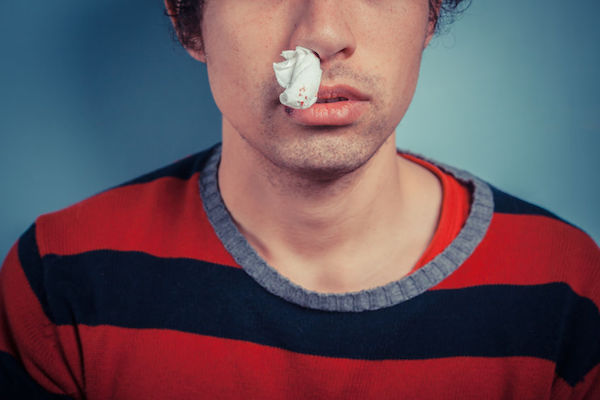Nosebleeds can be as unpleasant as they’re unsightly, with blood dripping over your clothes and sometimes down your throat.

They’re more likely to happen in winter, when the mucous membrane lining your nose may dry out and crack, leaving the many blood vessels near the surface vulnerable. A knock, a sneeze, picking or straining can then trigger a nosebleed.
In winter you are also more prone to colds and sinus infections, and indoor allergens can be more common (dust mites thrive when we crank up the heat indoors), leaving your nose inflamed – enlarging the blood vessels, irritating the mucous lining and causing bleeding.
That nosebleed can then start a vicious cycle of scabbing, picking and more bleeding…
Steps to prevent winter nosebleeds
If you’re prone to bleeds, coat the inside of each nostril (about 1cm in) with petroleum jelly or other moisturiser once or twice a day. “Place a blob of lubricant on the fleshy end of you index finger,” says Durban ear, nose and throat specialist Dr Mike King. “Push it up the nostril, taking care the nail doesn’t scratch. Do it on both sides, and then with thumb and index finger, massage the nostrils together (on the outside of the nose).” Alternatively, you can spray with saline two or three times a day.
- To counter dry air from heaters, run a humidifier next to your bed.
- Make a conscious effort to avoid rubbing or blowing your nose too hard.
- Resist the urge to pick – especially if you already have a scab!
What to do if you have a nosebleed
- Don’t stuff anything up your nose to staunch the flow. “You could cause further trauma, and it just doesn’t assist the situation,” says Dr King.
- Don’t lie down or tilt your head back, which can lead to you swallowing blood and choking or vomiting.
- Sit up and lean slightly forward.
- Pinch your nostrils closed and apply gentle pressure for at least five minutes, breathing through your mouth.
- If bleeding persists, place an ice pack (or packet of frozen peas) over the bridge of your nose, and try sucking a piece of ice to help constrict blood vessels in your nose.
- Spit out any blood in your mouth and throat – swallowing it can cause nausea, vomiting or diarrhoea.
When to get medical help for your nosebleed
If you have frequent nose bleeds, or the blood flow is hard to staunch and you lose a lot of blood and feel weak or faint, or if you have any other symptoms (chest pains, multiple bruises), see your health professional.
They may recommend an ear, nose and throat or other specialist. If a bigger vessel further up your nose has ruptured, it may need to be cauterised to seal it, says Dr King.
Bleeds can sometimes be caused by sinus infection, rhinitis (inflammation of the nasal membrane caused by a cold or an allergic reaction like hay fever), a deviated septum or a growth.
They can also be linked to a medical condition such as high blood pressure, a bleeding disorder or autoimmune disease, or to chronic alcohol abuse and smoking.
Taking blood-thinning medications such as aspirin, warfarin or anti-inflammatories can lead to major bleeding from even a minor trauma, so take special care if you are on them, says Dr King.
IMAGE CREDIT: 123rf.com

